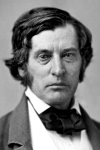We left Charles Sumner again putting Washington City behind him; he took his oath for a second term in the Senate and then his leave. He came to defeat a tariff, did that, and went away again. Though he had physically healed, Sumner remained still weak and found even his brief time in the Senate trying. Given he returned to the scene of his torment, it can’t have helped his mental health either. The Senator confided to E.L. Pierce, compiler of his Memoir and Letters, from which I have gotten many recent quotations, that he meant to depart for Europe at the end of the then-present session of Congress anyway.
Sumner came up to New York City, arriving on March 6, 1857. He stayed with John Jay, the son of the founder. The Fremonts, late presidential losers, called upon him there. The next day, Sumner quit the continent. Well-wishers saw him off from the dock and a Republican club fired off a thirty-one gun salute. Sumner left behind two letters. A brief note thanked the governor and legislature of Vermont for passing resolutions in his honor. The other letter went off to James Redpath, a reporter in Kansas.
Almost a year had gone by since the capture of the free state leadership at the sack of Lawrence. The struggle had gone on. Sumner had kept up with the news out of the nation’s troubled territory, but he wrote long on generalities. He reaffirmed his opposition to slavery, as if anyone would doubt it, and hoped Massachusetts would see fit to help Kansas in his absence.
I trust, also, that the people of Kansas will stand firm, and that, if need be, they will know how to die for Freedom. Do any sigh for a Thermopylae? They have it in Kansas, for there is to be fought the great battle between Freedom and Slavery, -by the ballot-box, I trust; but I do not forget that all who destroy the ballot-box madly invoke the cartridge-box.
I have a friend who studies ancient Greek warfare and sighs every time Thermopylae comes up. Popular culture, in Sumner’s time and now, remembers it as a desperate, heroic stand for Greek freedom against Persian tyranny. The heroes of the day come in the form of three hundred Spartans, slaughtered to a man. Their more numerous allies don’t get mentioned much. You may recall a film adaptation of a not particularly good comic on the subject from about ten years ago, starring Spartans in their traditional garb of an opera cape and a furry speedo. The symbolism of a patriotic army defending its home from foreign invaders remains apt for Kansas. The details, particularly how the Spartans and their allies lost the battle, Sumner had to know from his education in Classics. Redpath may not have, or he and Sumner might both have felt the popular symbolism took precedence over historical accuracy. The Senator meant to cast antislavery Kansans as embattled defenders of freedom, not give them a close lesson on ancient history.

You must be logged in to post a comment.